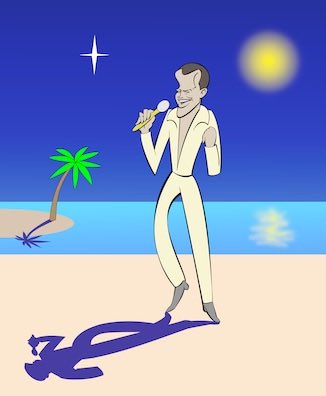Harry Belafonte

(Click to zoom in and out.)
Everybody knows Harry Belafonte as the #1 singer of calypso. But originally he set out to be an actor. After living in Jamaica he began working at odd jobs in New York City when he decided to audition for a role in Juno and the Paycock by the Irish playwright, Seán O'Casey. He was given the part and continued to work his way up in New York's theatrical scene. Then in 1953 he had his first film role as a school principal in the motion picture Bright Road. The next year brought him a Tony Award for his appearance in the variety musical Almanac as well as the star billing in the famous film Carmen Jones.
What many don't know is that Harry was actually born in the United States. His parents were immigrants from Jamaica, yes, and Harry was born in 1927 and lived in Harlem until he was five. Then for the next eight years he lived with relatives in Jamaica after which he returned to New York.
With the outbreak of World War II, he joined the Navy, and it was soon after his discharge that he and his friend Sidney Poitier decided to become actors. By 1960 both men could garner star billing and Harry was offered the lead in a Ralph Nelson movie. But he thought the plot was rather silly and turned it down. Instead it was Sidney who picked up the role as Homer Smith in Lilies of the Field1. Harry was never hesitant to point out how his error of judgement ended up landing Sidney the first Oscar for Best Actor that was awarded to an African-American.
Footnote
One irony of the novel is that it was one of the most popular religious novels of the mid-20th century. And yet in the book - making a point that isn't evident in the movie - the narrator states his purpose is to explain how the tales of miraculous events related to the building of the church were simply exaggerations and even outright fabrication.
Now although Sidney could sing quite well, it was Harry who really had the best voice, and with the release of his album Calypso he became the #1 purveyor of the genre. Largely because of Harry's smooth and lyrical style, calypso became seen as a pleasant easy-listening music celebrating the tranquil slow-paced life of the Caribbean islands. Americans soon saw Calypso as the signature music of Jamaica.
Calypso, though, originated on the island of Trinidad - as Trinidadians are quick to point out. The music arose from the slave communities on the island who carried their culture from West Africa. And the truth is that calypso is scarcely music with laid back and carefree messages.
The lead singer of calypso acts the part of the griot (pronounced "gree-OH"), a traveling troubadour whose songs tell his stories through irony and satire. Because the early music was of an enslaved people, the singers had to disguise the messages, particularly when they were ridiculing slavery in general and the slave owners in particular.
Like indigenous music of West Africa, calypso was backed with drums played with complex rhythms. But since some of the sharper slave owners detected subversion in the lyrics, they quickly banned all traditional percussion instruments of African origin. Unfortunately they couldn't prohibit frying pans, lids from trash cans, and steel drums, and these were quickly adapted to form the characteristic instrumentation of the bands.
Calypso began to proliferate through the Caribbean not just for entertainment, but also as a means of spreading news and offering commentary. Although traditionally the lead singers and band members were men, in the 1960's more and more of the emerging stars were women. Except in the United States where the music is still seen as easy-listening, true Caribbean calypso remains overtly and undisguisedly political.
In 1968, Harry was guest host on the Tonight Show. But not just for one night. He emceed the show for a whole week from February 5 to the 9th. At that time the regular host was Johnny Carson, and he gave Harry considerable freedom to select his own guests. These included not only Senator (and presidential candidate) Robert F. Kennedy, The Smothers Brothers Tom and Dick, "Downtown" singer Petula Clark, Paul Newman, Robert Goulet, the Director of the Metropolitan Museum of Art Thomas Hoving, Zero Mostel, and the Native American folk singer Buffy Sainte-Marie2, but also Lena Horne, Diahann Carroll, Wilt Chamberlain, bluesmen Sonny Terry and Brownie McGhee, poet Marianne Moore, Harry's good friend Sidney Poitier, Dionne Warwick, Freda Payne, Nipsey Russell, Aretha Franklin, and Martin Luther King.
Footnote
One commentator once criticized a writer who had referred to Buffy St. Marie as a "Native American", pointing out that she was Canadian.
Hm. The last time we looked, Canada was still part of the Americas.

Johnny Carson
He asked Harry for a favor.
Although at the end of the week Harry acknowledged that some might have seen him as using the shows to advance his views on civil rights, it evidently didn't bother many people. In any case, the programs he hosted were among the best of the Tonight Show, and he was back as guest host that December. Of course, he returned in later years to perform as a guest. The only favor Johnny had asked was when he wrote a short note to Harry asking him to introduce the show with a song and not a monologue. As Johnny put it "Harry, if you don't do a monologue, I won't unbutton my shirt."
References
"Harry Belafonte", The History Makers.
"The Subversive Power of Calypso Music", Benjamin Ramm, BBC, October 11, 2017.
"Harry Belafonte", Internet Movie Data Base.